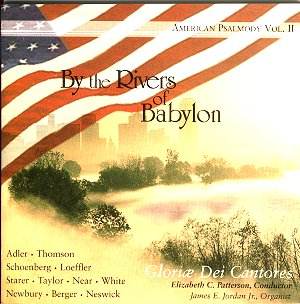Those
who know the Deux Rapsodies of Loeffler but are maybe,
like me, a little disappointed by his Pagan Poem, will
find the Loeffler they love in this beautiful work, which is musically
the jewel of this album. Unfortunately, the difficult intervals
and reaches of this music in performance reveal a few rough edges
on the chorusí technique, but nothing not easily forgiven in the
face of this wonderful music and our gratitude to them for bringing
it to us.
These
works by Virgil Thomson are very skilfully written but not remarkable
in regard to his other works, although the setting of Psalm 136
attains an uncommon dramatic urgency. Pairing the next work, a
setting of Psalm 130, with the following Schoenberg work on the
same text allows one to compare two totally different approaches,
and demonstrates the clear difference between competence and genius.
The
severe difficulties of the Schoenberg "De Profundis"
have brought out the best in this group, and the give us an excellent
performance. This is the strongly dramatic Schoenberg of Moses
und Aron, and as Tovey pointed out the adventurous harmonic
language can just as easily be explained in terms of traditional
harmony as it might be through any special "atonal"
or "serial" technique. This is anguished, passionate
music, with no gratuitous or fashionable dissonance. All the singers
perform their difficult parts with commitment and excellent tone,
to overwhelming effect.
Samuel
Adlerís excellent textbook on orchestration sits open on my desk
whenever Iím reading scores; these compositions of his are ingeniously
contrapuntal but otherwise unremarkable.
As
I said in my review of Volume 1, when I saw this disk performed
by a chorus and musicians resident at a religious commune on Cape
Cod, distributed by them to be sold in church bookstores, and
consisting exclusively of Psalm settings, I was, to say the least,
not looking forward to hearing it. I am for the most part a Buddhist
and generic Jahvistic religious music usually bores me at best.
However, after one look at the list of composers and ten minutes
into the disk I was cheering. The Psalms after all are Hebrew
poetry and part of our common human heritage of great literature.
Even sung in English thereís not much for even an agnostic to
find objectionable in the texts, which donít actually come across
that clearly most of the time anyway. But obviously they do serve
to inspire the singers, who are excellent. No Sunday amateur church
choir here!
The
Kent Newbury setting of Psalm 150, and the Cantate Domino
of David Ashley White are rousing and memorable, but also churchy
and repetitive. The rest of the music on this disk is much of
a type, modern American religious choral music with a certain
sound, every bit as monotonous as medieval church music can be,
albeit using different chords. Unless you are following the program
itís hard to tell when one piece ends and another begins. As settings
of the texts for devotional use they are skilfully written and
not unpleasant to listen to and the performers do their best to
vary the texture and give us urgent, effective renderings.
Paul
Shoemaker


